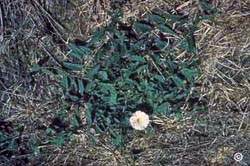
What is Bindweed?
Field bindweed is a noxious perennial weed that is difficult to kill because of its extensive root system. Roots grow deeply, 20 feet or more, as well as laterally. The root is capable of growing into new plants. It has distinctive arrowhead-shaped leaves and white or pink flowers. Bindweed grows along the ground until it encounters an object that it can climb, such as fences or other plants.
How can I get rid of bindweed?
No one treatment will eliminate established bindweed in one season. A multi-step approach is best: prevent the vine from producing seeds as they can survive for 20 years, overplant the area to outcompete and remove top growth when visible. Hand-pulling well-established bindweed generally does not kill it because of its root system but persistence can reduce energy in the roots. Bindweed is a sun-loving plant, so shading it out with cloth or other plants can be an effective control.
Is it possible to manage bindweed?
Herbicides such as Round-up, 2,4-D, dicamba or related chemicals can be effective in managing bindweed, but killing it with herbicides takes several applications over a period of years. Late summer and early fall applications are most effective. In a lawn environment, 2,4-D and related herbicides are preferred. Round-up or 2,4-D can also be used in flower beds and vegetable gardens. Be sure to apply 2,4-D when temperatures are between 65 degrees and 85 degrees Fahrenheit and winds are less than five mph.
It is important not to spray desirable plants with herbicides because it may kill those plants. Sponging or painting the bindweed with an herbicide is best when bindweed and desirable plants are in close proximity.
For more information, see the following Colorado State University Extension fact sheet(s).


